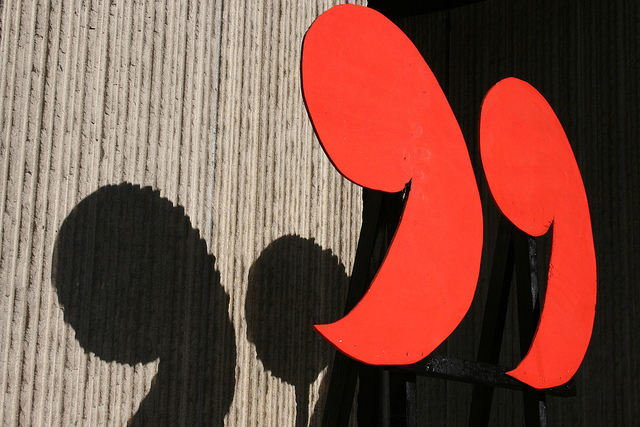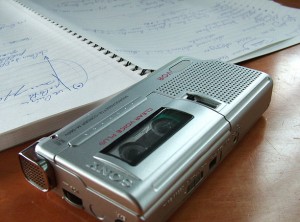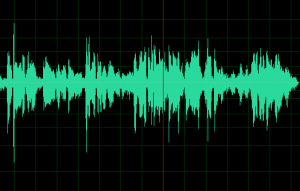How to improve your quotes and voice clips

(photo: flickr/Quinn Dombrowski CC:BY-SA)
Almost every news or feature story – whether it’s for print, broadcast or online – benefits from having good quotes, voice clips or sound bites.
Quotes directly express the views of the people you talked to, lend credibility to your story, and liven up your writing. Quotes are like a spice that adds flavor and zest to your story. Without them, while your piece might well have a lot of informative facts, it can be pretty bland.
But figuring out exactly which bits to pull from your interviews and put in your story can be challenging even if you are an experienced reporter.
onMedia’s Kyle James has trained radio, print and online journalists in countries around the world for years. In this post, he offers a few guidelines on keeping an eye out for what’s quotable and what’s not.
What should a quote do?
Quotes add the human dimension to the news, even in hard news stories. They give authenticity to a story, telling readers (or listeners or viewers) how people involved in the story think or feel – in their own words. Quotes can make issues more concrete and understandable, and put flesh and blood on abstract ideas.
(In the interest of brevity, I’m mostly going to use the word “quotes” in this post. But it will also refer to voice clips, sound bites or whatever term your particular medium uses for relating direct speech.)
A quote from a single mother hit by a reduction in social welfare benefits can show have a tax cut might affect the poor. A quote from a small-business owner on difficulties she’s having in the face of stricter government regulations can illustrate the impact of new legislation.

(photo: flickr/Eelco CC:BY-NC)
Quoting people also lowers the risk that you, the journalist, might misrepresent what someone says. If you broadcast their exact words, you’re more likely to stay out of trouble if that person isn’t happy with what you reported.
Good quotes should make your listener sit up and take notice, and should be more likely to stick with people after the story. (This is especially true in broadcasting, where we hear someone’s actual voice, and maybe even see their expression as they’re speaking).
Maybe the single mother’s voice choked when she talked about having a hard time buying groceries. Maybe the business owner’s eyes flashed with anger at the thought of the money she’d have to spend satisfying new regulations.
Now, a couple of terms:
Direct quotes – these are exact transcriptions of what a person said. In print stories, these go in quotation marks.
“Their ultimate sacrifice is yet another example that freedom is not free. In fact, sometimes it comes at a great cost,” said US General Roger Brady, speaking at the ceremony honoring fallen soldiers.
Indirect quotes/paraphrasing – these reflect the meaning what a person said, but the wording is not exactly the same. No quotation marks are needed.
Speaking at the ceremony honoring fallen soldiers, US General Roger Brady said the servicemen’s sacrifice was an example of the high cost of freedom.
What makes a quote good?
Interviews you do are going to contain some information which is quotable and probably a lot which isn’t. So how do you decide? Below is a list of what makes a sentence or two a good quote candidate.
–It contains an opinion
Traditional news style says neutral reporters are not supposed to let opinions into their newswriting unless they’re attributed to someone or represented in a quote. It’s even better if that opinion is expressed in a strong or memorable way.
“I am so fed up and angry with this government,” said Heng Chunly, a nurse who had joined the protest. “I came here to see justice done since I am sick of all the injustice in Cambodia.”
–It expresses feeling or emotion
A memorable quote can communicate the emotions felt by a person involved in the story. In the best cases, it also reflects the speaker’s personality.
I pulled the two clips below out of an interview with Eleanor Howard, an American woman whose husband Bill died during the Berlin Airlift in the late 1940s. The clips reflect the emotion she still feels, more than 60 years later, when she thinks about her late husband. Plus, her southern American accent is simply delicious.
Eleanor Howard:
“[Bill was] such a fine Christian man, and so good lookin’!”
“And I saw the base chaplain. And I literally turned to stone. I knew something had happened. And so I opened the door to a sea of sad faces and they told me Bill was gone.”
–It’s an eyewitness account
Our readers/listeners get a front-row seat, in a sense, at events we weren’t at. For example, in the Berlin Airlift story, I also interviewed a woman who lived in Berlin during that time.
“Our enemies who had once dropped bombs on us were now bringing us food, and coal to heat our homes with,” said Erika Demitrowitz, who was 24 when the airlift began. “I can remember the day the airlift was over, we picked all the flowers we could and took them to the Americans. That was our ‘thank you’.”
She takes us back to a time long ago and marvels at the sudden switch in circumstances as the once-hated enemy becomes a savior of sorts. It’s good stuff.
What makes a weak quote?
–Background or factual information
While this kind of information is crucial for any news story, it’s not the best material for quotes.

If there are lots of numbers and statistics, it’s probably best to paraphrase (photo: flickr/MervynChua CC:BY-NC)
Why should we quote an analyst telling us that job growth last quarter was one percent, and is expected to increase by 0.3 percent next quarter and then fall slightly after that? It might be solid information, but it’s a pretty boring print quote and absolutely deadly for broadcast.
Paraphrase the analyst instead. Put his or her comments in your own words. You can probably write them more succinctly and save valuable print space or broadcast seconds for the more meaty quotes.
–Unclear or confusing speech
While professional speakers might know how to consistently express themselves in crystal clear quotes and sound bites, the rest of us mangle things occasionally. If someone expresses something in a manner that’s unclear, we need to use an indirect quote or paraphrase it.
–Jargon/specialized language
Many fields, even journalism, have their own specialized language that is mostly unknown to outsiders. That means when you hear someone speaking in jargon, you need to politely ask them to use terms familiar to the general populace.
I did a lot of business reporting for radio at one time and would come up against this problem frequently. Economists tend to speak their own rarified language, which can be pretty incomprehensible to non-specialists. I would often have to ask them to rephrase something in a simpler way. If they couldn’t or wouldn’t, I’d rewrite the information in easier-to-understand terms, attributing it, of course.
How many quotes should I use?
Remember that quotes are the spice that livens up the story. They give it color and authenticity while adding the human element. But just like in the kitchen, too much spice can make a dish inedible. So use quotes, don’t abuse them. Don’t string a bunch together just because you have them in your notebook.
This is even more important with radio or TV, where you usually only have a short period of time to tell your story. You need to be especially careful to only use the most powerful clips/sound bites that meet the criteria laid out above.
Can I ever change quotes?
Good journalists are very careful with quotes. The cardinal rule is simple: you should never change the meaning of something someone said.
 Now, let’s say you’re recording an interview and someone starts off a sentence you want to use, then goes on a long tangent before looping around to finish off the thought about a minute later. In that case, I would say it’s OK to cut out the superfluous information in the middle, or delete all the “you knows” and “likes” scattered about, to end up with a concise, strong quote/clip. The crucial thing is that the quote reflects what the interviewee meant to express.
Now, let’s say you’re recording an interview and someone starts off a sentence you want to use, then goes on a long tangent before looping around to finish off the thought about a minute later. In that case, I would say it’s OK to cut out the superfluous information in the middle, or delete all the “you knows” and “likes” scattered about, to end up with a concise, strong quote/clip. The crucial thing is that the quote reflects what the interviewee meant to express.
In print this is easy — maybe too easy. With digital editing systems, it’s not all that harder, in many cases. But be careful, if you accidentally change the meaning of something someone said, it can easily turn out to be a body blow to your own credibility and will only hurt you in the long run.
To print out a one-page summary on good and not-so-good quotes, click here.
Written by Kyle James, edited by Kate Hairsine



